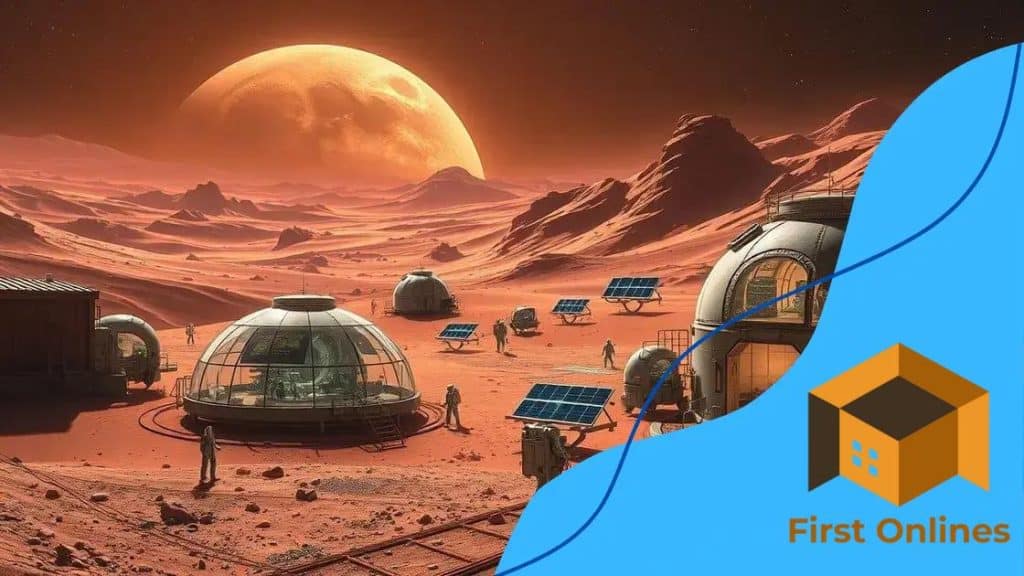Space exploration: the race to colonize Mars by 2030

Anúncios
Colonizing Mars involves overcoming challenges like harsh environmental conditions, resource scarcity, and psychological effects, while fostering technological advancements and international collaboration that can benefit humanity both on Mars and Earth.
Space exploration: the race to colonize Mars by 2030 is heating up as nations and private companies aim to make history. Have you ever thought about what living on Mars would be like? Let’s dive into the innovative efforts shaping our future.
Anúncios
The current state of Mars exploration
The current state of Mars exploration is a fascinating topic that reflects humanity’s determination to reach beyond our planet. Various missions are currently in progress and each contributes to our understanding of Mars.
Robotic Missions
Robotic missions are the backbone of our exploration efforts. Rovers like Perseverance and Curiosity provide valuable data about the Martian surface. These sophisticated robots are equipped with advanced tools to analyze soil and air, seeking signs of past life.
- Perseverance is searching for ancient microbial life.
- Curiosity continues to study the Red Planet’s climate.
- InSight monitors seismic activity on Mars.
These missions not only gather data but also test technologies that may support future human exploration. They are paving the way for what might come next.
Anúncios
Future Missions
Looking ahead, agencies like NASA and ESA have ambitious plans. NASA’s Artemis program aims to establish a sustainable presence on the Moon first. This will prepare astronauts for eventual missions to Mars.
Meanwhile, SpaceX is developing the Starship to transport humans to Mars. Their goal is to launch orbital missions within the next few years, which is a significant leap forward in our quest.
Moreover, there are discussions about sending humans to Mars in the 2030s. This timeline reflects a growing confidence in the technology and knowledge developed through earlier robotic missions.
In summary, the current state of Mars exploration is marked by groundbreaking robotics, ambitious future missions, and a commitment to prepare for human presence on the Red Planet.
Key players in the race to Mars
The key players in the race to Mars include both national agencies and private companies. Each organization brings unique goals and visions to this ambitious endeavor. Their collective efforts are shaping the future of space travel.
NASA’s Role
NASA has been a pioneer in space exploration for decades. With its Artemis program, NASA plans to return humans to the Moon as a stepping stone to Mars. They are developing new technologies and spacecraft, such as the Space Launch System and the Orion Crew Vehicle, which are essential for deep space missions.
- NASA focuses on scientific research and technology development.
- Its long-term goal is to send astronauts to Mars by the 2030s.
- Collaboration with international partners is key to its success.
This collaborative approach not only shares costs but also combines expertise from different countries.
SpaceX’s Ambitious Plans
SpaceX, led by Elon Musk, aims for rapid exploration and colonization of Mars. The company is building the Starship, a fully reusable spacecraft designed for long-duration missions. Musk’s vision is to establish a human settlement on Mars within the next few decades.
SpaceX has already accomplished remarkable milestones:
- Successful cargo and crew missions to the International Space Station (ISS).
- Development of the Raptor engine for interplanetary travel.
- Plans for orbital flights around Mars in the coming years.
This aggressive timeline is pushing the boundaries of what is possible in space exploration.
Other significant players include the European Space Agency (ESA), which collaborates with various countries to advance Martian knowledge. Additionally, private companies like Blue Origin and Lockheed Martin are contributing innovative technologies to support missions to Mars.
As each of these players brings their strengths to the table, the race to Mars is becoming more dynamic and collaborative than ever before.
Technological advancements enabling colonization

Technological advancements are crucial for enabling the colonization of Mars. These innovations span various fields, from life support systems to transportation and habitat creation. Each advancement plays a vital role in making human settlement on Mars a reality.
Life Support Systems
Life support systems are fundamental for sustaining human life on Mars. Advanced technologies are being developed to generate oxygen, recycle water, and produce food. For example, systems that can use the Martian atmosphere to create oxygen are vital.
- Water recycling systems can drastically reduce the need for additional resources.
- Hydroponics may allow crops to grow without soil, utilizing less water.
- Research for closed-loop systems focuses on sustainability.
These innovations ensure that astronauts can survive in the harsh Martian environment.
Transportation Technologies
Transportation to and from Mars is another critical area of focus. Spacecraft like SpaceX’s Starship are being designed to carry large numbers of people and cargo. These spacecraft will aim for fuel efficiency and reusability, enabling cost-effective travel.
Additionally, advancements in propulsion technologies, such as ion engines, could significantly reduce travel time to Mars. Such innovations make regular trips to Mars feasible.
Habitat Construction
Creating habitats that protect humans from radiation and extreme temperatures is essential. New materials and designs for Martian habitats are being tested. 3D printing technologies are being explored to build structures using Martian soil, significantly lowering the cost and the need to transport building materials.
Smart designs are being developed to maximize space and ensure the safety of inhabitants. As technology continues to evolve, it will play a vital role in shaping the first human settlements on Mars.
In conclusion, the combination of life support systems, transportation technologies, and innovative habitat construction strategies are paving the way for future colonization efforts. These advancements highlight the potential for a sustainable human presence on Mars.
Challenges of living on Mars
Living on Mars presents numerous challenges that must be addressed for successful colonization. The harsh environment and limited resources pose significant obstacles. Understanding these challenges is essential for planning future missions.
Harsh Environmental Conditions
The climate on Mars is extremely different from Earth. With greatly reduced temperatures averaging around -80 degrees Fahrenheit at night, these cold conditions can be life-threatening. Mars also experiences dust storms that can last for months, covering the planet.
- Radiation exposure is a serious concern due to the thin atmosphere.
- Limited sunlight during dust storms can hinder solar energy production.
- Extreme temperature fluctuations create significant challenges for habitat designs.
Each of these factors requires innovative solutions to protect human health and maintain a livable environment.
Resource Scarcity
Resources on Mars are limited, which creates logistical challenges. Water is essential for survival, but it is scarce. Although there is evidence of frozen water in ice caps, accessing it will require advanced technology. Likewise, food production will need to rely on hydroponics or aeroponics while utilizing minimal water.
Additionally, the lack of materials for construction means habitats may need to be built using in-situ resources, necessitating research into effective building techniques on Mars.
Psychological Challenges
The psychological well-being of Mars colonists is also a major consideration. The isolation and distance from Earth can lead to feelings of loneliness and anxiety. Close-knit crew dynamics will be essential to maintaining morale during long missions.
Long-duration travel and the confined living spaces can exacerbate stressors, requiring plans for mental health support. Solutions may include communication devices to connect with loved ones back on Earth, as well as recreational activities to keep spirits high.
In summary, by addressing the harsh environmental conditions, resource scarcity, and psychological challenges, we can prepare for a sustainable future on Mars. Each of these elements plays a crucial role in ensuring the success of human colonization efforts on the Red Planet.
Future implications for humanity
The future implications of colonizing Mars are profound and far-reaching. As humanity looks to establish a presence on another planet, we will face opportunities and challenges that could reshape our world.
Technological Advancements
The push to colonize Mars will drive technological advancements in various fields. Innovations needed for life support, habitat construction, and transportation will not only benefit Martian missions but also improve technologies on Earth. For example, advancements in renewable energy and water recycling systems developed for Mars may lead to sustainable solutions on our home planet.
- Improved life support systems can enhance our ability to live sustainably.
- Technological innovations can lead to new industries and job opportunities.
- Research on Mars can expand our understanding of climate change and environmental science.
As we tackle these issues, humanity stands to gain valuable insights and tools from our experiences.
Inspiration and Unity
Colonizing Mars can serve as a powerful source of inspiration and unity for our planet. The global effort to reach Mars can bring people together across cultures and borders. Just like the Apollo missions inspired generations, new missions to Mars could ignite interest in science, technology, engineering, and math (STEM) fields.
Increased public engagement in space exploration can foster a new generation of innovators and thinkers, leading to an era of unprecedented collaboration. Educational initiatives focused on space exploration might encourage young people to pursue careers that can benefit humanity as a whole.
Long-Term Survival of Humanity
Looking at the long term, establishing a human presence on Mars may play a crucial role in the survival of humanity. By becoming a multi-planetary species, we can reduce the risks posed by potential global disasters, such as climate change or asteroid impacts. Mars colonization could provide an alternative home for humanity if Earth becomes uninhabitable.
Additionally, our efforts could lead to discoveries and knowledge that enhance life for everyone on Earth. As we explore Mars, we will learn more about our own planet, the universe, and our place in it.
Ultimately, the implications of colonizing Mars highlight the importance of collaboration, innovation, and vision as we step into a new chapter of human history.
FAQ – Frequently Asked Questions About Mars Colonization
What are the main challenges of living on Mars?
The main challenges include harsh environmental conditions, resource scarcity, and psychological challenges for the inhabitants.
How could Mars colonization benefit technology on Earth?
Technological advancements needed for Mars can lead to innovations in renewable energy, water recycling, and sustainable living that can benefit life on Earth.
What role will international collaboration play in Mars colonization?
International collaboration will be crucial for pooling resources, expertise, and knowledge to successfully establish a human presence on Mars.
Why is inspiring future generations important for Mars exploration?
Inspiring future generations can ignite interest in STEM fields and encourage young people to pursue careers that contribute to science and exploration.





